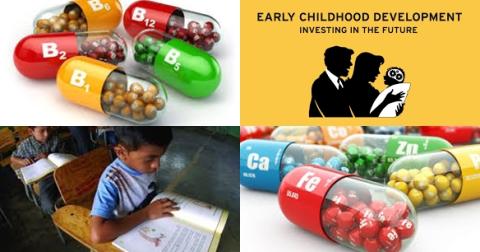
Objectives:
Nutritional supplements may be important on cognition but the evidence is heterogeneous. Therefore, this review article (meta-analysis) has been conducted.
Do both childhood nutritional supplementation and antenatal nutritional supplementation improve cognitive development of children in developing countries?
Study design:
This review article included 48 studies with 29814 children (16944 and 12870 children were in the intervention and control arms, respectively) from 20 developing countries.
Childhood nutritional supplements included iron (25 interventions), zinc (23), folic acid (18), lipid/fat (13), calcium (14), vitamin A (14), vitamin B2 (13), protein (11) and vitamins B1, B3, B12 (9).
Antenatal nutritional supplements given to mothers during pregnancy included zinc (15), iron (10), vitamin A (10), vitamins B1, B2, B3, B12 (10), vitamin C (9) and iodine and selenium (8).
Funnel plots and Egger regression tests showed no publication bias in both childhood and antenatal supplementation.
Results and conclusions:
The investigators found childhood nutritional supplementation significantly improved children's cognitive development [d = 0.05, 95% CI = 0.004-0.10, p = 0.03, n = 44] and those with ≥5 nutrients was particularly beneficial [d = 0.15, 95% CI = 0.08-0.22, p 0.0001, n = 16].
The investigators found antenatal nutritional interventions non-significantly improved children's cognitive development [d = 0.02, 95% CI = -0.01 to 0.06, p = 0.20, I2 = 47.45%, p 0.0001, n = 23].
The investigators found timing of nutritional supplements was also associated with the cognitive benefits of supplementation.
Antenatal supplementation appeared to have the strongest benefit when started in the first trimester of pregnancy [d = 0.15, 95% CI = 0.03-0.28, p = 0.02, n = 4]; supplementation started later did not yield any significant benefits.
Similarly, supplementation on children aged 6-18 months had significant benefit [d = 0.09, 95% CI = 0.02-0.15, p = 0.009, n = 27] whereas those of older children did not [d = 0.04, 95% CI = -0.06 to 0.16, p = 0.37, n = 15].
The investigators found duration of follow-up (i.e. the time between intervention completion and outcome assessment) was significantly associated with the benefits of antenatal supplementation.
Interventions with ≥5 years of follow-up had significantly stronger benefits [d = 0.10, 95% CI = 0.02-0.19, p = 0.02, n = 5] than the others [d = 0.005, 95% CI = -0.04 to 0.05, p = 0.94, n = 19].
Such phenomenon was not observed in childhood supplementation.
The investigators found in childhood interventions, several nutrient types were associated with cognitive benefits:
-iron [d = 0.09, 95% CI = 0.03-0.15, p = 0.01, n = 25];
-zinc [d = 0.09, 95% CI = 0.02-0.15, p = 0.01, n = 23];
-calcium [d = 0.14, 95% CI = 0.07-0.21, p = 0.0002, n = 14];
-vitamin B2 [d = 0.11, 95% CI = 0.03-0.19, p = 0.01, n = 13] and
-protein [d = 0.13, 95% CI = 0.03-0.22, p = 0.01, n = 11].
The investigators found in antenatal supplementation, several nutrient types were associated with cognitive benefits:
-iron [d = 0.05, 95% CI = 0.002-0.10, p = 0.04, n = 10];
-vitamins B1, B2, B3, B12 [d = 0.05, 95% CI = 0.01-0.10, p = 0.02, n = 10] and
-vitamin C [d = 0.07, 95% CI = 0.02-0.12, p = 0.004, n = 9].
The investigators concluded childhood nutritional supplementation, especially those with ≥5 nutrients, is effective in improving cognitive development of children in developing countries. However, future supplementation should aim to provide multiple nutrients to younger children and pregnancy women at the first trimester. To identify the optimal supplementation, future studies should include both short- and long-term assessments on the cognitive performance of children and consider the potential interactive effects of different nutrients.
Original title:
Impact of nutritional supplements on cognitive development of children in developing countries: A meta-analysis by Ip P, Ho FKW, […], Hon KL.
Link:
https://www.ncbi.nlm.nih.gov/pmc/articles/PMC5587553/
Additional information of El Mondo:
Find more information/studies on food fortification/malnutrition, pregnancy, vitamins and minerals right here.